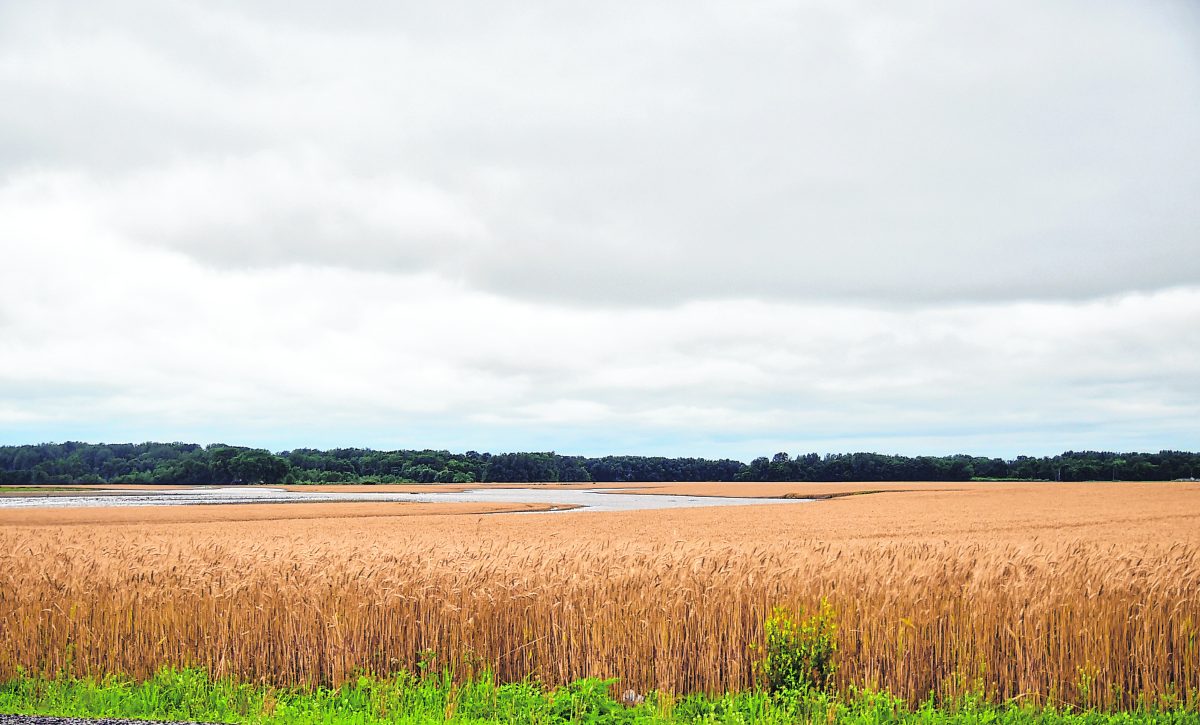
There are two large John Deere tractors sitting under a barn on Charles Lawyer’s farm in northeastern Jackson County.
There’s nothing particularly unusual about that this time of year. It’s just Lawyer and his sons, Glenn and Darrin, only have about 40% of their 2,000 acres planted.
The group made a decision Monday to not plant the remaining acreage because of certification dates to plant their crops and the looming weather.
[sc:text-divider text-divider-title=”Story continues below gallery” ]Click here to purchase photos from this gallery
“That’s the first time I’ve ever done that, and I’ve farmed here since 1963,” said Charles, who is 76-years-old. “This is one for the history books for me.”
The Lawyers are just one example of farmers in Jackson County, the state and Midwest who report they are struggling with planting this year due to persistent, nearly unrelenting rainfall.
Jackson County has received 8.24 inches of rain since last week, according to the National Weather Service. That ranked first out of the service’s 39-county coverage area for that time period.
The county also has had about 35 inches of rain this year, which is more than 12 inches higher than the average year for this time, according to the Brownstown Central High School weather station.
That amount of rain has created a hardship unlike any other for many farmers, including the Lawyers.
“Last year was the closest because it was so wet, but we got it planted and had to keep going back and doctoring it some,” he said. “Not this year, and that’s difficult.”
In a typical year, the group, which includes Charles, his sons and his grandsons, Dalton and Cory, typically begin planting sometime in mid-April and make it through about 200 acres a day on properties in northeastern Jackson and northwestern Jennings counties.
They first planted May 5 this year, Darrin said.
Now with such little planted, the group will tend to what they have planted, and shift their focus to what can be done for next year.
Darrin said the group will begin installing drainage on idle ground, create seed beds and make other preparations.
“The focus is for next year and forget about this year,” he said. “Everything you have done is out the window, and there’s no recouping your time or money. It’s pretty frustrating.”
That’s particularly frustrating, Charles said, because they still have to pay for fertilizer, taxes and more. They own about half of the 2,000 acres they farm.
“A lot of farmers are going to be hurting,” he said. “You can count on it.”
It’s not just large farming operations affected by the rain, either.
Steve and Celeste Bowman operate a produce farm in northeastern Jackson County.
The family raises produce on 3 acres and sell their products at the Seymour Area Farmers Market. They also grow several acres of hay and straw each year to feed their cattle and swine.
They struggled with getting plants planted, preparing the ground and more. Since they’ve planted, it also has been difficult to keep it cultivated, weeded and hoed.
“Everything seems to be a struggle this year,” Celeste said.
That includes the hay fields they have only cut once. Typically, the hay would have already been cut twice, so now, the Bowmans will have to rely on purchased hay at a higher cost.
The Bowmans also don’t have as much sweet corn, watermelon, cantaloupe, peppers, tomatoes, onion, cabbage and broccoli to offer customers at the farmers market.
They still have plants waiting to be planted in their greenhouse.
“At this time of the year, it’s normally pretty empty,” she said.
But the traffic hasn’t stopped at the thriving market in Seymour, Bowman said, so oftentimes, they sell out of what they do have. That’s about half of what they usually have to offer customers.
Heavy rains earlier this week forced Steve to dig a trench through the cantaloupe patch in an effort to relieve it from floodwaters.
“The weather has been hard on us,” Celeste said.
It will even impact the Seymour FFA, which usually plants about 70 acres of field corn as a source of revenue. The group will convert the acreage to beans, which are less profitable. The federal government has offered farmers relief from prices because of trade disputes, but that does not apply to the Seymour FFA.
The organization also plants sweet corn, which they still plan to sell later than usual. Still, the impact won’t prevent the organization from operating programs.
“We are well-prepared financially to still support our program and scholarships awarded from the school farm,” Seymour FFA adviser Jeanna Eppley said.
Glenn Lawyer’s business, Lawyer Excavation and Crane, also has been affected by the rain. He said the business is running behind by about a third of its work.
Projects in Greenwood and Columbus have been difficult to complete because of saturated ground.
“The rain just stops you because we can’t get soil to compact,” he said. “With the ground being wet, it’s hard when people need building pads built or streets put in. We are having a hard time to get anything to get solid.”
Charles said he has a friend who lives at the Arkansas and Louisiana line and farms who has experienced similar delays.
“If they don’t get it in by the end of March or first of April, they face the heat,” he said. “He said he has more money in the crop than he can get out of it.”
Charles also worries those stories — like his — will have a ripple effect on everyone.
“It hasn’t hit this country yet, and it’s not just here because it’s all across the farm belt,” he said.
